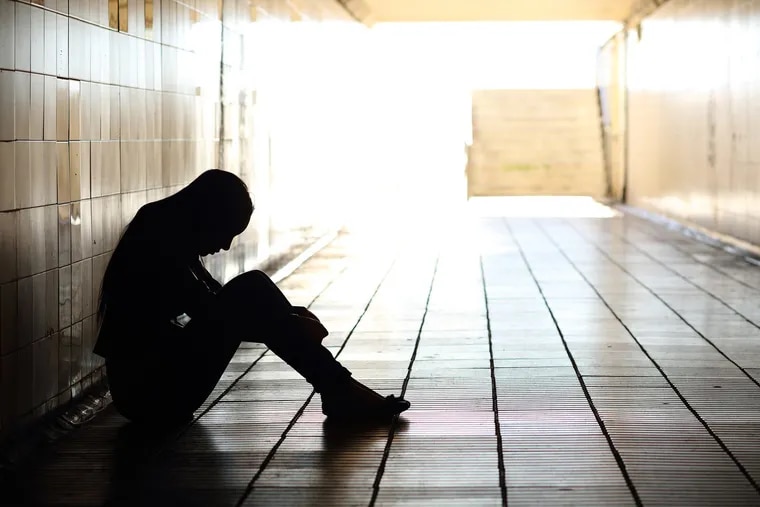[ad_1]
A recent government report concluded that the nation’s teens — especially teen girls — are in a mental health crisis.
Based on a survey of more than 17,000 high school students, the U.S. Centers for Disease Control and Prevention found that among girls:
-
60% experienced feelings of persistent sadness or hopelessness.
-
30% said they had considered suicide — a 60% increase compared with a decade ago.
-
Nearly 20% reported experiencing sexual violence in the last year.
“High school should be a time for trailblazing, not trauma,” Debra Houry, the CDC’s chief medical officer and deputy director for program and science, said in a statement about the study. “These data show our kids need far more support to cope, hope, and thrive.”
St. Christopher’s Hospital for Children in Philadelphia is one of the institutions attempting to better address teen mental health. Brigid Garvin, clinical director of psychology at the hospital, recently spoke with us about the hospital’s new mental health initiative and what caregivers can do to help.
What do you think was the most important finding of the recent CDC study?
I want to note one that is positive and hopeful. The finding emphasized the idea of connectedness as an important factor for resilience. It reinforces what decades of research have told us: that a supportive and safe adult in a child’s life is the most important factor contributing to positive mental health outcomes and positive life outcomes.
That finding also provides guidance to us as providers of mental health. We need to create programs and support models that emphasize the importance of connectedness. We need to identify individuals that create a safe, inclusive, and supportive place for youths to go to when they might be experiencing a mental health need.
How is St. Christopher’s integrating mental health into the hospital setting?
There has been a lot of much-needed discussion over the past few years — certainly magnified by the pandemic — about the need for greater access and more support. In the continuum of mental health care, we certainly have great needs on the acute side. We need more mobile crisis units, better access to crisis centers, more beds for acute care. Longer-term, that’s an area St. Christopher’s would like to grow.
But with this program, we wanted to think about another response. Instead of focusing on crises, what if we stepped back and took a proactive approach, starting with primary care? We want to create a culture where both physical health and mental health are part of the standard care of a pediatric practice. It would involve creating a setting where you have access not only to your pediatrician, but also to mental health providers.
Just as our pediatricians emphasize the importance of everything from getting vaccinated to wearing safety belts for physical health, the idea that they could start to address mental health skills at an early age is wonderful.
One of the ways to do it is simply to start talking, early and often, about mental health. Initially, it would be with the caregiver. Then, when she or he is old enough, with the patient. It would involve, for instance, reinforcing some of the positive coping skills: how to recognize emotions, how to deal with frustration. We need to teach coping skills so the youth doesn’t default to something harmful, such as drugs, alcohol, or risky sexual behavior. Creating the conversation early is part of it.
The patients have to come here every year anyway when they’re younger, so if we start young enough, incorporating the behavioral and mental health part just becomes part of the routine.
Can you describe a typical visit?
The beauty of using the pediatric visit to address mental health is that, typically, the pediatrician already has a relationship with the child and the family. The pediatrician might start with a screening tool that asks questions about mood, worries, anxiety, about the presence of suicidal ideation.
When a child transitions to the teenage years, it’s typical for a visit to include some questions that a caregiver steps out of the room for — questions about safety, sexuality, or other things the patient may not be ready to talk about in front of their caregiver.
Most of our caregivers do not balk at this. They want their child to communicate with someone. They trust the pediatrician that’s been in their lives for several years at that point. I do believe that now, more than ever, we are creating safer places for youths to communicate their needs.
What can parents and caregivers do to help teenagers?
Parents can mirror what we’re trying to create here: a culture of inclusivity, a safe space where we can talk about mental health in a positive way.
If a parent is concerned about the mental health of their child, we encourage them to ask early and ask often. There’s a misconception that if you ask a youth whether they are having thoughts of suicide, for instance, it might prompt them to have those thoughts.
But what we know from years of research is that if a child is, indeed, experiencing suicidal ideation, they’re glad you asked about it and could give them the support they need.
Parents might want to explore some of the newer ways that teens — with monitoring, of course — can access support. There are some excellent apps, some great resources, that help our teens and adults practice some of these positive coping strategies, starting with checking in with their feelings and emotions.
What are the next steps for St. Chris’ approach to youth mental health?
In the end, I think that if our vision of creating a culture where mental health is part of the standard of primary care proves true, the benefits could be huge and long-lasting. I look at some of the infants and toddlers we see today and envision that when they are teenagers, the idea of checking in with a mental health professional is just part of the scenery.
Better still, our patients may become parents themselves one day. I love the idea that what they learned as youths about incorporating mental health care into overall health care will help them help their own children. It will be perpetuated into the next generation.
[ad_2]
Source link


